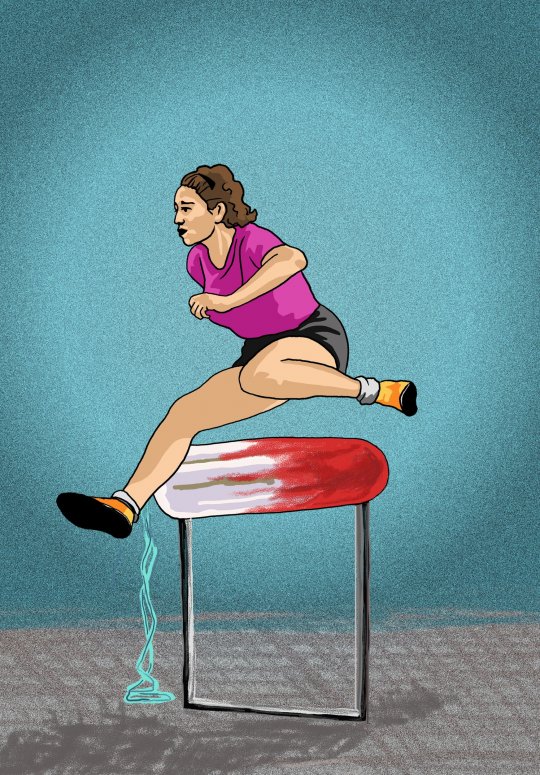Shattered. It would be nice if the coaches knew which girl is on her period when.

Most of the coaches are men
In sport, there is eternal pressure on the result, you have to prove yourself all the time, without it there are no scholarships or sponsors.
“Then it’s hard to find time to say ‘stop’. It’s not easy to jump out of a speeding train, give yourself a moment, rest,” says Cichocka.
For years, she gave her best in training. When she was on her period, she mentioned to her coach that she was not feeling well, but she was still doing the scheduled training. But sometimes she just wouldn’t finish it, cut it off in the middle, she was exhausted.
“Everything hurt, but I did not allow myself the thought that I might not do the training, I did not even suggest that I would not be able to do it. And when you are on your period, you should be more relaxed when exercising, listen to your body. Not just training, training and training all the time,” she says.
But it was only years later that she realised that the period was a topic that should be discussed.
“Now I do not have a problem with it, but when I remember myself from a few years ago, then menstruation was not discussed. Well, maybe between my closest friends, but not openly. Maybe it embarrassed me? I decided that it was not important, that it was my business and not, for example, of the coach or my parents. I thought that everything would follow its own rhythm.”
The former European champion in the 1,500 meter run believes that nowadays it is easier for young athletes to talk about these topics. “Now the youth are more open. When I started running, I was unsure of myself, I didn’t talk about my needs and problems,” she adds.
Joanna Mitrosz, the best Polish artistic gymnast in history, also only talked about periods with her closest friends.
Patrycja Salwa, a football player and captain of the AP Lotos Gdańsk extra-league team, also admits that menstruation is a topic that she raised only among her closest friends.
“You know, these conversations were like this: one is late, and the other one hasn’t been on her period for four months. Irregular menstruation is a common problem among female players. But many people are embarrassed about this topic, and we should talk and make people aware, talk about it as much as possible,” she believes.
Sometimes it is difficult, because most of the coaches are men.
“Conversations on this subject depend on your relationship with your coach, when you trust them, then there is no problem,” says Salwa. “But it is often the case that when players complain that they are on their period, they hear: ‘Take it easy’, ‘Keep training’ or ‘Don’t be silly’. While there are also coaches who understand, they then say: ‘I see, my wife is like that too, let it go.’”
Angelika Cichocka believes that menstruation should be reported to a person who influences training.
“You should sit down and talk, how the competitor feels, it should not be an embarrassing topic,” she says.
Salwa emphasises that it would be good if the coaches knew when which girl is on her period, it is a matter of health.
“Since blood is being tested to see what indicators it has, it’s good to also take hormones into account,” she adds. When she was 17, she started having problems with menstruation. Instead of a few days once a month, she had her period practically every week. This led to anaemia.
“Nobody checked it, nobody got interested in it in the club. It ended with a one-year break, I had to recover, get back on my feet,” the AP Lotos Gdańsk player recalls now.
Is it easier in team sports?
Joanna Mitrosz is happy because she did not have painful periods or any discomfort, nothing stood in her way when training.
“I went to training even when I had a fever. I couldn’t imagine giving up in training, would I have to do it in a competition too? Period? I came to terms with it, it’s part of my life, you just have to accept it and do your own thing. I started gymnastics when I was six, and ended up as a 25-year-old athlete. My periods were naturally in tune with my effort, after all, I had been training for years by the time I got my first period. It is a matter of systematic effort and training,” she says.
Artistic gymnastics is a discipline in which the margin of error is minimal, there is no time for weakness. Mitrosz emphasises that she did not take any steps to prolong or accelerate menstruation.
“Gymnastic training, at the competitive level, at least six times a week, at least two a day, and even eight hours before the Olympics. Therefore, it would be difficult to arrange your workouts according to the cycle phase. At the highest level, I had a competition every week. It is obvious that it is impossible to exercise 365 days a year to the full, there are sometimes worse days, but I do not remember my period influencing my training,” she adds.
She feels it is easier to let go of when playing a team sport.
“Then you know that someone can replace you when you have a bad day. A friend will come in and give 100%, because you would only be able to give 80. In individual sport, this is impossible.
Failed Olympics
Angelika Cichocka changed her approach to discussions about menstruation after the Olympic Games in Rio in 2016.
“In the same year in Amsterdam, I won gold at the 1,500-meter European Championships, many people bet on me for the Olympic medal, I was in my life form. But then, after a long break, I got my period. Even now, when I look at the photos from that time, I can see how heavy and swollen I was,” she recalls.
She made it to the finals on momentum, but it was over, and she could have had a really good result. Today she knows that she should have taken care of matters related to her period earlier.
“I should have prepared for it, regulate my period, tell the doctor about the first symptoms. Then it was too late. But I was not aware that I could do it, consult. I told the coach that I felt bad, but it ended there,” she regrets.
Cichocka knows how important it is in sport – as far as it is possible – to arrange each issue, you cannot allow yourself to be accidental, everything has to be adjusted to ensure top form for the competition. Also, if possible, your period.
“Menstruation in sport should not be a taboo, it has a real impact on the result. Training should be adjusted to hormonal changes,” she adds.
Until now, she has unregulated menstruation, she is checked frequently, she tries to adjust everything using natural methods.
“When I feel exhausted, I let go. My approach to training has changed, so you should listen to your body when it’s sending signals. If you do not do it, you will make it once or twice, but in the end the body will fail,” says the athlete.
Affectionate technology
In sport, where every detail counts, controlling the menstrual cycle seems to be part of preparing a competitor for the competition. And it’s still so neglected.
According to BBC Sport, 60 percent of sportswomen who took part in the survey conducted by the station stated that menstruation affects their results and that they skipped training or competitions because of it. At the same time, 40 percent stated that they did not feel comfortable discussing these topics with the coaches. Many of the surveyed athletes took pills to regulate their periods because competing during menstruation became too painful or uncomfortable for them.
“For us as sportswomen it is very important to know our body,” said Steph Houghton, a Manchester City player, in an interview for Sky Sport. Her team and 15 players from eight Olympic and Paralympic disciplines take part in the research of the English Institute of Sport. The aim is to allow female athletes and coaches to adapt their training, nutrition and rest times to their menstrual cycle. This is thanks to the Harmonix software that measures the levels of oestrogen and progesterone from a saliva sample.
The first results of the research are already in. British pentathlonist Jess Varley praises the software, emphasising that understanding the menstrual cycle allowed her to get rid of many of her worries, modify her diet to minimise the symptoms of menstruation.
The menstrual cycle was monitored by American female football players, led by Megan Rapinoe and Alex Morgan during the 2019 World Cup in France. It became another tool that was supposed to allow for domination on the pitch.
Cycle control is very important in the context of many US studies that show women are up to eight times more likely to suffer from cruciate ligament injuries than men. This happens on the days that precede ovulation.
Although, as noted by the magazine The Athletic, only 3 percent of sports performance analysis is devoted to women.
These are the data gaps Caroline Criado Perez writes about in her book “Invisible Women”. Researchers do not notice female athletes, science treats women as “little men”.
It is all slowly beginning to change. One of the biggest football stars, Englishwoman Lucy Bronze, believes that sportswomen, when talking about menstruation, can disenchant the subject in society as a whole.
“Many people still find it embarrassing. Sportspeople are trying to change that, which is good,” says the footballer.


